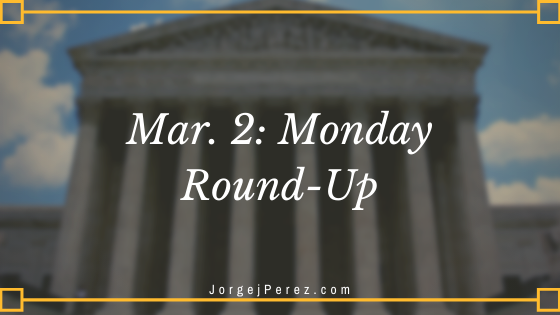In the first March 2020 edition of her Round-Up series, Edith Roberts highlights two immigration cases as it relates to the acquisition of a review for deportation decisions in addition to her typical overview of recent articles pertaining to the law.
Topics discussed in said articles include abortion rights, the constitutionality of the Consumer Financial Protection Bureau (CFPB), birth control, religious freedom, non-partisanship in the Supreme Court, and a linguistic approach to understanding the Second Amendment.
Read an excerpt from the blog post below.
___
Today the justices will begin the second week of the February session with oral arguments in two cases that involve immigrants’ ability to obtain judicial review of deportation decisions. First up is Nasrallah v. Barr, which asks whether courts of appeals have the authority to review factual findings underlying decisions denying deferral of removal. Jennifer Chacon previewed the case for this blog. Lachanda Reid and Gabriela Markolovic have a preview for Cornell Law School’s Legal Information Institute.
The second argument this morning is in Department of Homeland Security v. Thuraissigiam, in which the court will decide whether limitations on review of expedited deportation orders in habeas proceedings violate the Constitution’s suspension clause. Kari Hong had this blog’s argument preview. Cornell’s preview comes from Basem Besada and Grant Shillington.
At The Washington Times, Alex Swoyer reports that Seila Law v. Consumer Financial Protection Bureau, a constitutional challenge to the structure of the CFPB that will be argued tomorrow, “will test the separation of powers and whether the CFPB, which was created during the Obama administration and is the brainchild of Democratic presidential candidate Sen. Elizabeth Warren, runs afoul of the Constitution because its director is largely shielded from being fired by the president.” According to Joan Biskupic at CNN, the case “provokes core questions of how involved government should be in people’s lives and how far presidential power should extend.” For The Wall Street Journal (subscription required), Brent Kendall and Yuka Hayashi report that the CFPB “has been politically polarizing, with Democrats citing a need to rein in financial-industry excesses and Republicans warning the CFPB could be a vehicle for runaway government regulation,” and that “[t]he same sort of ideological split has carried into the courts.”
___
Read the rest of the blog on SCOTUSblog.com.

